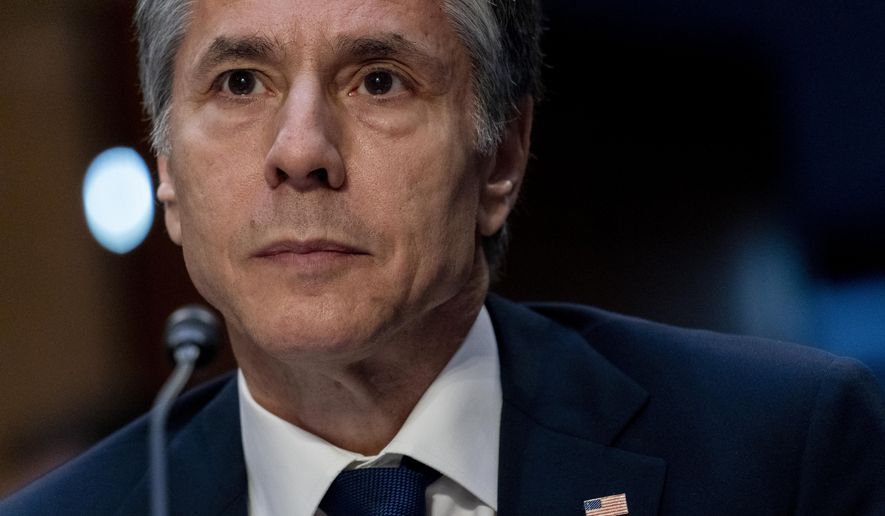Secretary of State Antony Blinken said Sunday that relations between the U.S. and Russia are at their lowest point in recent years as President Biden prepares to meet with Russian President Vladimir Putin this week.
The high-profile meeting slated for Wednesday in Geneva at the tail end of Mr. Biden’s first foreign trip abroad has drawn fire from some in Washington recently who say the administration is rewarding Mr. Putin despite increasing Russian aggression against the United States.
“It’s not a matter of trust,” Mr. Blinken told CBS’s “Face the Nation.” “I think someone once said ‘trust but verify.’ I’d say, ‘don’t trust and verify.’ We’ll see by Russia’s actions whether it will make good on — on any commitments it makes.”
Biden administration officials have claimed leading up to the meeting that they seek a more predictable relationship with the Kremlin, following a recent spate of high-profile cyberattacks emanating from Russian bad actors, Mr. Putin’s attempted murder and jailing of Russian opposition leader Alexei Navalny, and his backing of Belarusian President Alexander Lukashenko, who forced the landing of a commercial flight to detain a Belarusian journalist.
“What the president is going to make clear to President Putin is that we seek a more stable, predictable relationship with Russia, and if so, there are areas where our interests overlap, and we may be able to find ways to work together,” Mr. Blinken told Dana Bash on CNN’s “State of the Union.” “But if Russia chooses to continue reckless and aggressive actions, we will respond forcefully, as the president has already demonstrated that he would when it comes to election interference or the SolarWinds cyber attack or the attempt to murder Mr. Navalny with a chemical weapon.”
Mr. Blinken told “Fox News Sunday” host Chris Wallace that the U.S. would begin testing Russia on whether they seek a more stable relationship, and on areas where the U.S. and Russia can find mutual interests.
But key questions still remain in terms of what specific actions the administration will take in responding to Russia and what specific message Mr. Biden intends to convey in his meeting with Mr. Putin.
Mr. Putin reportedly remarked earlier Sunday that he would be willing to turn over Russian cybercriminals if the U.S. hands over those he claims to have attacked Russian interests.
Mr. Blinken said no country should harbor cybercriminals and that it would be on the summit agenda, but he gave few details in terms of specific actions in response.
In terms of sanctions, ABC’s Martha Raddatz pressed Mr. Blinken on whether the sanctions that were imposed after last year’s hacking of the Solar Winds information technology firm had worked.
“Well, there are a few things. One is you never know the dogs that don’t bark,” Mr. Blinken said.
But he said sanctions are less effective when they are not backed by other countries.
“We’re now coming off of G-7, we’ll be coming off of NATO, we’ll be coming off an EU meeting,” the secretary of state said. “Collectively, when our countries are actually working together, rolling in the same direction militarily, economically, diplomatically, politically, it’s an incredibly powerful force.”
Several lawmakers have challenged the Biden administration’s posture toward Russia as weak, claiming that the administration has not taken aggressive enough actions toward Mr. Putin. Namely, the summit follows the administration’s recent decision to waive sanctions against Nord Stream 2 AG, effectively greenlighting the completion of a Russia-backed natural gas pipeline spanning Europe from Russia to Germany.
“The president waved in the natural interest Nord Stream II which will be Putin’s pipeline going into Europe so that Europe — European — you know, our partners will be dependent on Russian energy,” Rep. Michael T. McCaul of Texas, the ranking Republican on the House Foreign Affairs Committee, told Ms. Raddatz after Mr. Blinken’s appearance. “I don’t think that’s in the United States’ national interest. And, quite frankly, it’s not in Europe’s best interest either. And this really empowered Putin when this happened. And I think we’re giving him a lot of stuff.”
Mr. McCaul said last week that the administration’s decision to meet with Mr. Putin effectively rewarded the Kremlin and sent a dangerous message.
“I’ve repeatedly said that Vladimir Putin is not our friend,” Mr. McCaul said in his opening remarks before Mr. Blinken’s testimony to the House Foreign Affairs Committee on Monday.
“I think the price for admission, to a ticket for this seat, was way too high,” Mr. McCaul told Ms. Raddatz on Sunday.
The administration recently announced that the two leaders will not hold a joint press conference following the summit.
• Joseph Clark can be reached at jclark@washingtontimes.com.




Please read our comment policy before commenting.